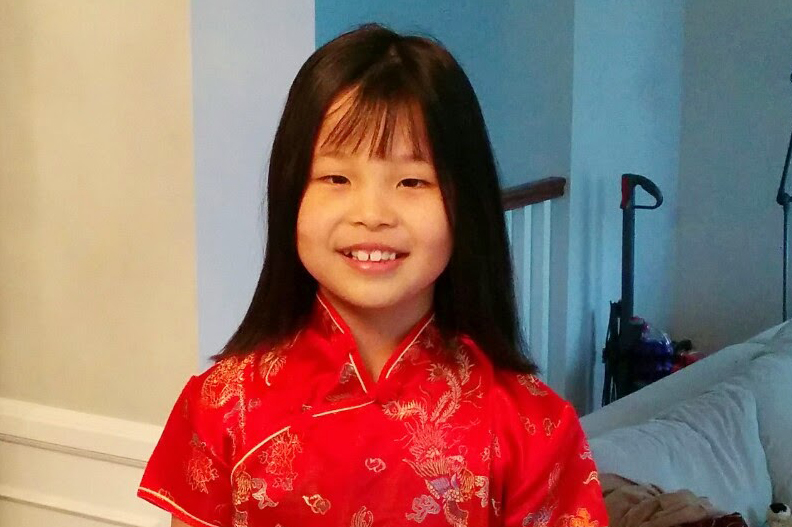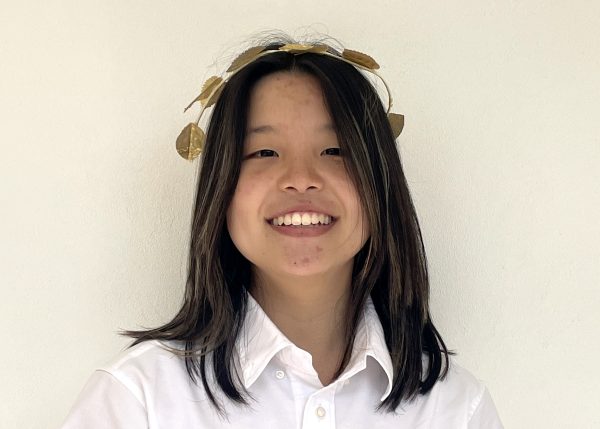Op-Ed: Asian American assimilation is not yours to judge
Photo credit: Neil Yang
At 9 years old, I wear a qipao in preparation for Lunar New Year. Even if Asian Americans’ relationship to their culture is complicated, stigma surrounding assimilation is ignorant and unjustified.
May 17, 2023
When assigned to read “The Paper Menagerie” by Ken Liu in my 10th grade English class, I did not expect to cry. After all, why would I? I live every day as an Asian American, so no story about the Asian American experience should shock me. I’ve lived it all.
However, the plot following a half-Chinese boy living in suburban Connecticut caused me to sob uncontrollably. It was not that Liu offered a new perspective, but his story forced me to reckon with familiar feelings I had been avoiding for years, particularly the shame I attach to my culture.
In contrast to the protagonist of “The Paper Menagerie,” I never struggled with identity as a child. I was comfortable being American with my love of Barbie dolls and grilled cheese sandwiches, and I never protested going to a Chinese immersion school or wearing qipaos for Lunar New Year. The term “Asian American” was simple; there were two words, each of which bore equal weight on my shoulders.
As I grew up and, consequentially, became aware of anti-Asian racism, my view of my heritage grew resentful. I saw my identity as the cause of others’ hate, making me find refuge from my shame in assimilation.
According to the Census Bureau, 24 million Americans identify as Asian, making them 7.2% of the population. New York Times writer Jill Cowan reported on Asian Americans’ perceptions of self after the height of the pandemic. Across the country, they grappled with the idea of simply existing.
“They yearned to gain access to an American dream without the burden of prejudice,” Cowan wrote. “They wished simply to blend in. Others said they were embracing their Asian heritage after years of feeling like it made them somehow less American.”
One well-established way to “blend in” is adopting an anglicized name. This practice looks different depending on the individual but often consists of Asian Americans adjusting the spelling, pronunciation or entirety of their birth name to accommodate English speakers. Rooted in fear of xenophobia and the belief that a white-sounding name will bring economic opportunity, two names were practically the standard at my Chinese immersion school.
Though an obvious example, name changes are not the only ways to assimilate. In fact, cultural erasure affects things as basic as food. California State University Long Beach Professor Oliver Wang noticed culinary assimilation’s commonality and appearance as a trope in literature.
“Every Asian American memoir … included at least one requisite passage where an author expresses embarrassment over lunch boxes filled with kimchi or natto or curry that invited stares or jeers from non-Asian peers,” Wang wrote. “We yearned for hot dogs and hamburgers, milkshakes and chili fries: proper American fare to soothe assimilation anxieties.”
The American dream, or the idea that anyone can be a successful American, is truly a dream. Welcoming rhetoric, when paired with microaggressions or hate crimes, is devoid of meaning. When mocked for their accents, stereotyped on television or told to go back to their country, it is inevitable that Asian Americans would try to blend in to not be another reason for discrimination. Thai American Elie Mala believes the current portrayal of Asian Americans contradicts their true desire for unity.
“Just because we’re Asian doesn’t mean that we’re loyal to other governments and that we’re trying to play against you and that we’re on another team,” Mala said. “On the contrary, we’re on the same team. We’re Americans.”
With enough assimilation, being on team USA is possible. But, what are the consequences of assimilation?
At a predominantly white school, my Asian friends and I throw around the term “banana,” not to reference the fruit, but rather each other. Gordon Nagayama Hall of Psychology Today describes a banana as someone who is Asian or “yellow” on the outside, but American or “white” on the inside. I have been called a banana when admitting my illiteracy in Mandarin and have fired the word back when my friend conceded her love of pizza.
Often, a judgemental tone or fake laugh is paired with the “You’re such a banana” comment, proving it is far from complimentary. Superficially casual, this insult accuses Asians of succumbing to white hegemony. This logic disregards the potential necessity of assimilation, whether for simplicity or safety. Immediate criticism of the decision to assimilate overlooks Asian Americans’ risk of facing prejudice, even if minuscule in a seemingly inclusive environment.
Similarly to Jack, the main character in “The Paper Menagerie,” I am constantly questioning who I am. Every day brings choices that ask me to balance the Asian and American parts of myself. No matter the love I have for my culture, I sometimes make the “wrong” choice. I might speak English with relatives and forget to take off my shoes before entering the house.
If that makes me a banana, so be it.










